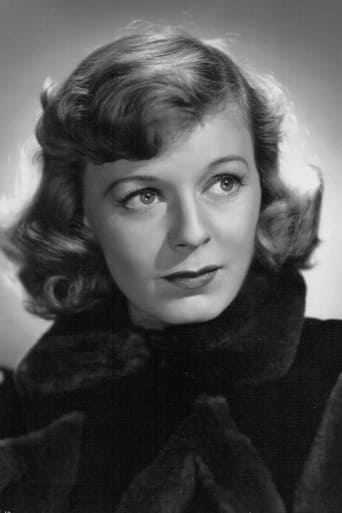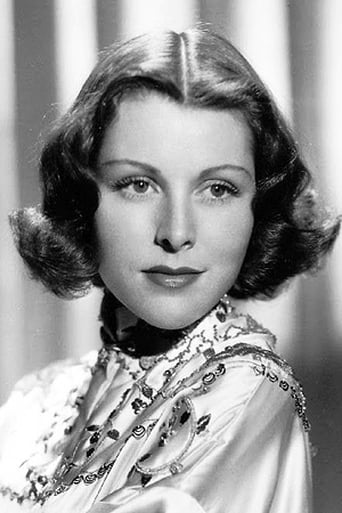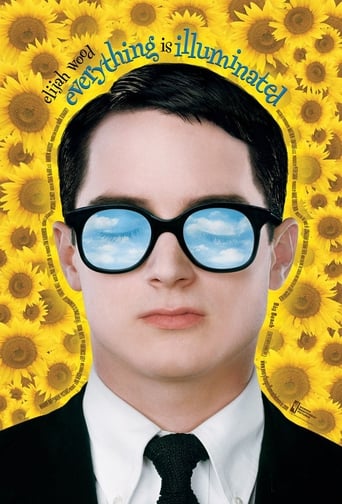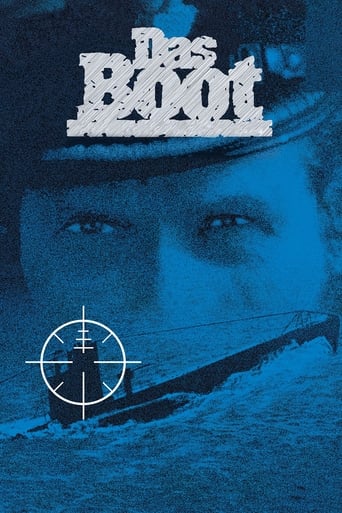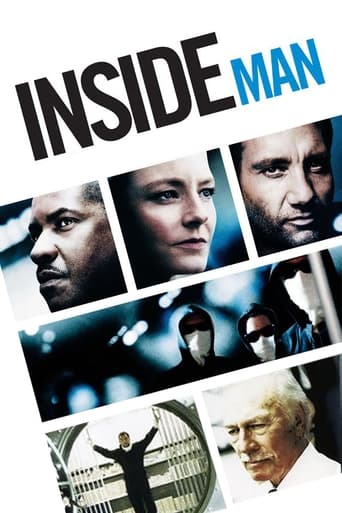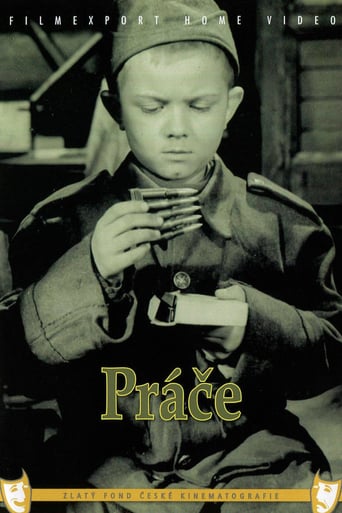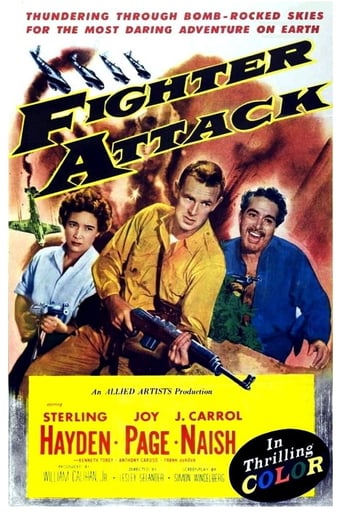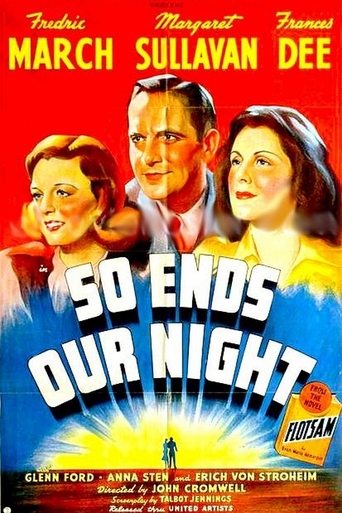
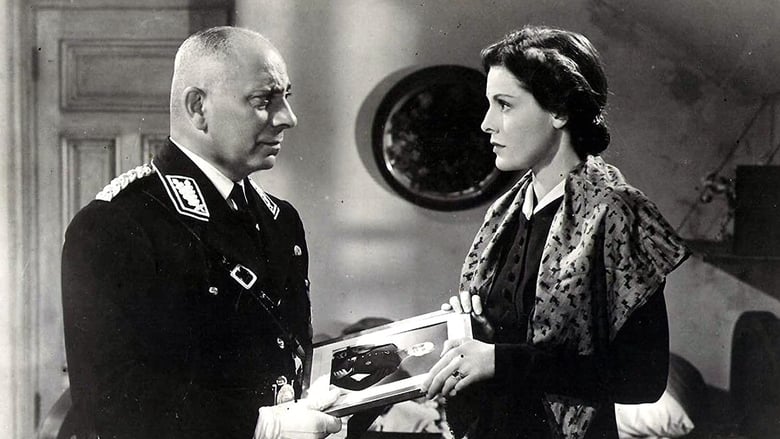
So Ends Our Night (1941)
An anti-Nazi on the run and a young Jewish couple race across Europe trying to escape Hitler's ever powerful influence.
Watch Trailer
Cast


Similar titles
Reviews
If you don't like this, we can't be friends.
Highly Overrated But Still Good
best movie i've ever seen.
A terrific literary drama and character piece that shows how the process of creating art can be seen differently by those doing it and those looking at it from the outside.
"So Ends Our Night" is an anti-Nazi film based on a novel by Erich Maria Remarque--the man whose works were banned by the Party due to his insistence in his writings (such as "All Quiet on the Western Front") that war was not at all fun but actually quite bad (imagine that!). As he himself had been forced to flee Nazi Germany, it's not at all surprising that this story is all about German expatriates who also fled the nation for their lives. The film came out 10 months before the US entered WWII and was actually among the first to be critical of the fascists. Despite the war in Europe having been raging for a year and a half, the US film industry was very slow to produce films condemning the Nazis--mostly due to stupid anti-First Amendment legislation that forced neutrality in films.The film stars three actors who didn't seem the least bit German--Frederic March, Glenn Ford and Margaret Sullavan. And so, it seemed more like three Americans trapped in Europe. However, despite being strong American accents (which is odd, as the supporting characters all have European accents), the actors did a fine job in the film and the story was compelling.As for the story, it's about three people who have fled Germany and are forced to wander about Europe, as they have no passports and are always one step away from deportation (where it would mean almost certain death). The three did not know each other until their exile but are now becoming good friends--thanks to the bind of shared misery. Again and again it looks as if one of them might somehow escape but repeatedly their efforts to legally remain outside Germany are thwarted. I was surprised, however, that March was given a much smaller role than Ford, as in 1941 Glenn Ford was definitely a newcomer and March was an established star.While this is a very good film, I couldn't help but notice that there were a few better anti-Nazi films from the same era--in particular, "Mortal Storm" (also starring Sullavan) and "Arise My Love". Still, it was quite compelling and I am sure it did a lot to solidify the American public towards the notion of one day joining in the war.
So Ends Our Night is based on the Erich Maria Remarque novel Flotsam which describes the plight of refugees in Europe, dislocated from their homes and sometimes families as a result of the politics of tyrannical European states, specifically Nazi Germany. Any place they went the refugees were not welcomed becoming a drag on the economy of any place they lived. The film concentrates on a group of several now stateless Germans who seem to keep running into each other. The novel came out in 1939 before a formal war started, but the German intentions were becoming clearer every day.Specifically it concentrates on Fredric March who was an underground member in Germany who had to leave in a hurry, he could not take his ill wife Frances Dee. March becomes a surrogate parent to both Glenn Ford and Margaret Sullavan who find a difficult path to love when they're first concern is survival.Previous to So Ends Our Night coming out, Remarque novels such as All Quiet On The Western Front and Three Comrades were filmed with marked success by both Universal and MGM. All Quiet On The Western Front won a Best Picture Oscar and a Best Director Oscar for Lewis Milestone and Three Comrades got good critical reviews in 1938. Margaret Sullavan was in Three Comrades and she was the love interest of one of the comrades, Robert Taylor. Would that So Ends Our Night was as good.The performances by the players were all good, Glenn Ford was lent out from Columbia Pictures for his first A film and got great reviews as a tender callow youth. He and Sullavan seemed to have good chemistry, but the film lacked the production values that a major studio could have given it. And the script seems to drag and the direction is sluggish.Margaret Sullavan who specialized in playing tragic heroines who are escaping from the Nazis, she just came off doing The Mortal Storm for MGM which is about folks about to become refugees. Compare that film with MGM quality on it to this one and you'll see what I'm talking about. According to a biography about her by Lawrence Quirk she resented the way the title was changed, preferring that it be called by the novel's rightful name. This name implied all kinds of innuendo that the film never delivered. True, but that was a common enough practice back in the day. And So Ends Our Night needed any and all help to get the movie going public into the theater.In that same book Fredric March and Glenn Ford both praised Sullavan's abilities and considered a milestone to have been able to work with her. Sullavan in fact got director John Cromwell to direct Ford as a callow and clumsy youth in matters of love whereas he'd come off like Cary Grant in earlier takes. I think she was on target there.Still the film definitely needed major studio backing to have put it over better.
All the players deliver fine multi-dimensional and interesting characters in this fine 1941 movie, but especially Glenn Ford and Mergaret Sullivan. I did not find the story depressing because most characters dealt with their unfortunate situation of being exiles without papers (and thereby forbidden jobs and usually hunted down) with determination and a will to survive.While holding nothing back in my recommendation that you at once order this long-unavailable film in DVD, I have just one bone to pick with it, one that didn't even exist when the film was made in 1941: I do not like the way persons in the movie industry have re-written the history of World War II to create the erroneous impression that it was all about the Jews, the Jews, and nothing but the Jews. Ask any young person today about World War II and they'll answer in the context of the Jews. Bunk! What does anybody think about the 20 minute obliteration of Rotterdam, or the fire-bombing of London? Better yet, visit the cemetery at Normandy (which the drive-by media forgot all about this year; not one word of remembrance for those who bought our freedom with their lives; of no importance to NBC, CBS or ABC.)The evil of the Nazi's and their hatred of other people included Catholics, Protestants, Poles, English, French, Dutch, Belgians, Czechs, Hungarians, and a whole lot more. With this caution and this reservation, I recommend this movie. Plot, history, characterization, emotion, people you'll care about. They don't make movies like this anymore. We've seen Sex and the City, so now what? Kung Fu Panda? Don't Mess with Zohan? I think we'll stay home.
I just saw this over the weekend for the first time on DVD, though I'd seen it in college and never quite forgot it. The impact of Erich Maria Remarque's story of German refugees in Europe must've been enormous to those few who saw this sparsely distributed movie in 1940/1941.The Historical Context: This film, made prior to the American entry to the war but after the fall of France, may have helped to prepare the American public for the coming war, as in "The Mortal Storm" and "The Man I Married" and like the later movie, "Watch on the Rhine", gave the issues involved a human face, but is much more profoundly fatalistic than any of those other movies. Even at the somewhat hopeful conclusion, and especially since we view this movie today after the Holocaust was revealed, the doomed atmosphere that pervades a lot of the action is still sobering over a distance of 65 years.I couldn't help thinking that the theme of the movie is still sadly relevant throughout the world. Another interesting aspect of the film is something that I cannot answer but hope that some well informed individual might be able to help with eventually. I don't see how this movie could've gotten a production code approval. Some of the outré aspects of the story include a woman offering herself quite frankly to a March and removing her outer garments, the fact that two characters live together--in sin, as they used to say, and the fact that a sympathetic character commits suicide, an event that the film treats as an act of heroism. The print that I saw says that the movie was made by David L. Loew-Albert Lewin, Inc., and distributed theatrically by United Artists--but could movies really be distributed much of anywhere without the explicit okay of the production code at that time? I realize that Loew and Lewin had deep connections to MGM and big-time money in Hollywood and NY, but I really doubt if the filmmakers would've been willing or able to pay any of the fines that the Production Code office may have imposed for a violation of their principles.Best Aspects: I found the restrained and touching performance of Fredric March as an Aryan German who was opposed to the Nazi government to be the centerpiece of this movie, even though he's only in about half the scenes. The expression on his face in one scene in which he's trying to catch a glimpse of his wife's face in a crowd just before leaving her to go into exile is very moving. Frances Dee as the wife is very expressive in her brief, nearly silent but haunting scenes. March's resilient spirit, and his deeply effective final scene, the antics of Leonid Kinskey, and a lovely, relaxed performance from Anna Sten, add to the interest of this film for me.Good Aspects: Margaret Sullavan, whom I usually find to be a magnetic actress, seems at somewhat of a low ebb in this film. Yet, there is one vibrantly delivered speech that she gives about why she loves the puppy-like Glenn Ford that shows a flash of her ability to breath life into material. She is suddenly, for that one sequence an actress who makes the viewer understand that politics aside, its the connections of Sullavan, March, Ford and Dee to one another that keeps each of these characters tethered to their humanity despite everything that they are going through. Ford, playing a very believable teenager who is the child of an Aryan & Jewish marriage, is earnest and most affecting in his reminiscences of home and longing for a peaceful existence.Technical Aspects: The script is heavily reliant on flashbacks and narration, and at times it was a bit hard to keep track of which nation the refugees found themselves in, though overall, the strong leads and great supporting players, who also include Erich Von Stroheim, Sig Rumann, and Roman Bohnen, manage to rise above the sometimes disjointed script . The issuance of the film on DVD is welcome, but unfortunately, the picture quality of the transfer is sometimes overly bright and occasionally fuzzy, and the sound is a bit muddy at times, but it is adequate, and the good acting, compelling story and excellent direction by the underestimated John Cromwell still make it quite watchable.In general, I'd hope that others might comment on this movie, and suggest it for viewing by those interested in that period's "premature" anti-fascist films.



